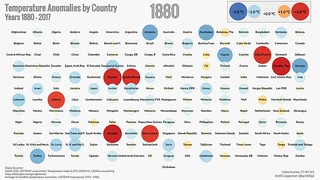Archiv ‘Energie’
Samstag, 5. Februar 2022
Wie zwei fehlende Meter Deutschland und die Schweiz in die Stromknappheit führen
Link zu diesem Artikel
Aeby Faktencheck: Der Spur nach richtig.
Its seawall was 19 feet high. Despite warnings in a 2008 report suggesting that the plant could be exposed to a tsunami of up to 33 feet, the plant was still protected only by the existing 19-foot seawall when the tsunami struck. The tsunami that made landfall reached over 40 feet high, even larger than the earlier report had suggested was possible.
Quelle: Fukushima Daiichi Nuclear Disaster
Die damalige Mauerhöhe von 19 feet entsprechen 5.79 Meter. Die 2008 in einem Bericht empfohlenen 33 feet entsprechen 10.06 Meter. Die Tsunamiwelle war aber tatsächlich 40 feet hoch, das entspricht 12.19 Metern.
Ergo: Wäre die Mauer vor dem Unglück um 6.40 Meter erhöht worden, wären Deutschland und die Schweiz energietechnisch jetzt nicht auf bestem Weg zurück zu Schwellenländern, wo Stromausfälle an der Tagesordnung sind.
Übrigens auch ein Lehrbuchbeispiel von gescheitertem Risk Management: Selbstverständlich hätte die Erhöhung der Mauer einiges an Geld gekostet. Doch hätte man diese perfekt planbaren Baukosten den Kosten des Unglücks gegenübergestellt (u.a. ein Menschenleben wegen Radioaktivität, und 2202 Menschenleben bei der darauffolgenden Evakuierung, Evakuierung, Betriebsausfall, Engpässe in der Stromversorgung, vorzeitige Abschreibung des Reaktors, Reparaturkosten, Reputationsverlust), hätte jede Person mit gesundem Menschenverstand und minimster mathematischer Grundbildung die Variante Risiko-Mitigation gewählt.
Tags: AKW, Atomkraft, Deutschland, Energiewende, Energiezukunft, Erneuerbare Energie, Fukushima, Grüne, KKW, Nuklearenergie, Nuklearkraft
Labels: Energie, Schweiz
Freitag, 7. September 2018
Video: Klimawandel einfach, aber eindrücklich visualisiert
Link zu diesem Artikel

Ob das ganze jetzt menschgemacht ist oder nicht sei dahingestellt — wenn es in den letzten Jahrzehnten Anomalien gab, dann Hitze und nicht Kälte. Das Video beruht auf Messdaten, die wir in der Form erst seit etwas mehr als 150 Jahren erfassen. Ob es Perioden in der Menschheitsgeschichten gab, die ebenfalls solche heissen Anomalien aufweisen, weiss ich ebenfalls nicht.
Was ich aber weiss: Einen solchen Klimawandel gab es noch nie, als 8 Milliarden Menschen gleichzeitig auf dem Planeten gelebt haben.
Tags: Klimawandel, Video
Labels: Energie, Geschichte, Gesellschaft, Leben, Wissenschaft
Montag, 16. August 2010
Peak Everything
Link zu diesem Artikel
Peak water…peak oil…peak food…peak this, peak that. After so many alarms with so few fires, many people think they can put away the fire extinguishers. Higher prices draw forth more supply…and substitutes. The limits seem to recede forever.
But the threat of disaster hasn’t disappeared; it is just retreating in good order like the Tsar’s troops…waiting for the worst possible moment to strike. There is only so much arable land. There is only so much water. There is only so much energy to move food and water.
Quelle: The Rise, Fall, and Rise of Disaster
Ich warte geduldig auf diesen Moment …
Tags: Nahrung, Peak Oil, Umwelt, Weltwirtschaft
Labels: Energie, Wirtschaft
Mittwoch, 23. Juni 2010
Die BP-Hypokrisie
Link zu diesem Artikel
In a fight between a group of zombies and a real producer, their sympathies should be with the oil man. After all, when they drive into the filling station, it’s not the Congressional Record that they pump into their fuel tanks. And when they heat their homes, it’s not tort lawyers whom they look to for fuel. Gasoline is valuable. They know it. And they know that someone has to get it. In fact, so keen is their demand for octane, and so high is the price, that the producers are lured farther and farther away from dry land. No one would drill a mile below the water for oil unless a lot of people wanted it badly. Sooner or later, one of the rigs was bound to spring a big leak.
Quelle: The Zombies and the Oil Man
Passt doch perfekt zum Comic in der neuesten Ausgabe des Economists:

Quelle: The Economist, „KAL’s Carton“, 17. Juni 2010
Transkribiert:
Obama: „Sam! You’re addicted to oil! But it’s not too late … I can help you …“
Sam: „But we cannot waste any time …“
Obama: „We must embrace alternative sources of Energy!! You can be saved if we act now!!“
Sam: „Yeah!“
Obama: „Come on, sam!! Follow me!!
Sam: „Great!! I’ll get the car!“
Tags: BP, Erdöl, Umwelt, Umweltschutz
Labels: Energie, Politik, USA
Sonntag, 30. Mai 2010
Der grösste Erdölkonsument der Welt
Link zu diesem Artikel
Mr. Obama is not only America’s president. He also presides over the biggest single user of oil in the world – the US military. The pentagon uses twice as much oil as the entire nation of Ireland. It sends soldiers in oil-burning airplanes to places of no apparent importance where they drive around in oil-burning machines for no apparent reason.
Quelle: US Government to Kill Its Own Economy
Nun, ganz so sinnlos fahren die GIs nicht durch die Gegend, zufälligerweise sind diese ja sehr, sehr Nahe an den Erdölvorkommen stationiert, die die Armee zum Überleben zwingend benötigt.
Tags: Armee, Erdöl, Militär
Labels: Energie, USA
Dienstag, 18. Mai 2010
Wann dreht jemand „2015“?
Link zu diesem Artikel
The US military has warned that surplus oil production capacity could disappear within two years and there could be serious shortages by 2015 with a significant economic and political impact. […]
„By 2012, surplus oil production capacity could entirely disappear, and as early as 2015, the shortfall in output could reach nearly 10 million barrels per day,“ says the report, which has a foreword by a senior commander, General James N Mattis.
Quelle: US military warns oil output may dip causing massive shortages by 2015 | Business | The Guardian
Gesamtbericht: The Joint Operating Environment 2010 (PDF, 3MB)
Tags: Erdöl, Militär, Peak Oil
Labels: Energie, USA
Samstag, 8. Mai 2010
Die Energie-zu-Kapital-Alchemie stottert
Link zu diesem Artikel
Theoretically, oil production could continue to rise if there were enough investment. For example, one could theoretically ramp up oil sands production, plus oil shale production, and maybe even add some coal to liquid production. But to do something of this sort would require a huge amount of additional capital, and this in turn would require even more debt. Dennis Meadows of „Limits to Growth“ fame has said the limiting variable in our current predicament is capital. It looks to me as if we are at this point running up against this limit, certainly from the point of borrowing for capital. Real capital, created by net energy, has likely been declining for years.
Quelle: The Oil Drum | What connections are there between debt, oil prices, and personal income?
Genau davor habe ich momentan sehr, sehr grosse Angst.
Tags: Erdöl, Finanzen, Kapital, Peak Oil
Labels: Energie, Wirtschaft
Donnerstag, 26. November 2009
Die BKW hat offensichtlich zu viel Reserven
Link zu diesem Artikel
Die Waadtländer Bevölkerung stimmt am 29. November über die Haltung ihres Kantons gegenüber einem neuen AKW Mühleberg ab. Wie der Regierungsrat heute im Grossen Rat informierte, mischt sich die BKW mit 500’000 Franken in die Politik des Nachbarkantons ein.
Statt endlich in Windturbinen und Solardächer zu investieren, verschleudert die BKW viel Geld für politische Propaganda.
Quelle: Medienmitteilung SP/JUSO-Fraktion vom 24. November 2009
Tags: Abstimmung, Atomkraft, BKW, Kanton
Labels: Bern, Energie, Politik


